Grandfamilies: Grandparenting Tips
March
NDAFW Activity Ideas: Community, School-wide, and Online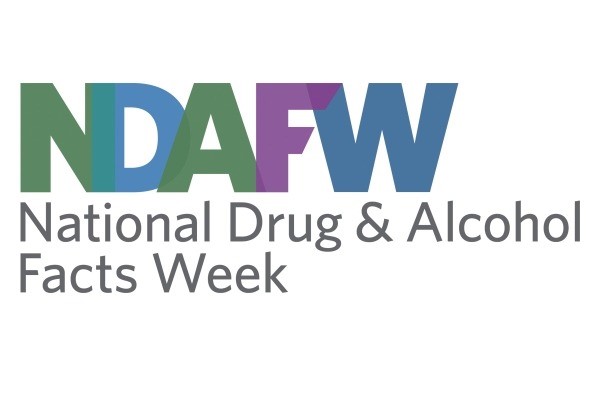
These activities, developed for use during National Drug and Alcohol Facts Week® (NDAFW), are designed to help youth in grades 6 through 12 learn about the effects of drug use on the developing body and brain. Each activity is self-contained 6and can be done on its own. As a youth caregiver, take time to interact with the activity sheets and fun opportunities this resource offers.
Lesson Plan Highlights: Youth activity sheets: Grade Level(s): 6 through 12
Youth Skills:
- Analyzing and interpreting information, data, and/or evidence
- Collaboration
- Creativity
- Critical thinking
- Giving a presentation
- Reading comprehension
- Writing
Duration: Varies by activity from 1 hour to a few hours (over several days)
Materials: Varies by activity
Languages: English & Spanish
Check this out: NDAFW Activity Ideas: Community, School-wide, and Online | National Institute on Drug Abuse (NIDA)
Kin Engagement Toolkit
 To support all working with the goal of finding “kin” for children, access the Kin-Finding Toolkit updated at the Child Welfare Playbook. All links to our Kin-Finding Toolkit have been updated to lead directly to the updated version, which features almost 20 practical strategies to help you locate and engage with family members and trusted adults (collectively called “kin” throughout this toolkit) who can provide placement or ongoing support for youth. If you have any questions about implementing a strategy in this toolkit or want to learn more about how a jurisdiction named as an example is doing things. We encourage you to reach out to us.
To support all working with the goal of finding “kin” for children, access the Kin-Finding Toolkit updated at the Child Welfare Playbook. All links to our Kin-Finding Toolkit have been updated to lead directly to the updated version, which features almost 20 practical strategies to help you locate and engage with family members and trusted adults (collectively called “kin” throughout this toolkit) who can provide placement or ongoing support for youth. If you have any questions about implementing a strategy in this toolkit or want to learn more about how a jurisdiction named as an example is doing things. We encourage you to reach out to us.
Kinship Care for Holidays
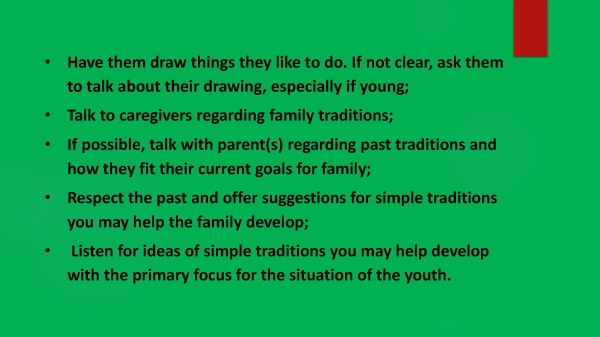
September
Don't miss Grandparents Week! September 7 - 13, 2025
 There is much in store for you this year. In addition to hearing from world-class presenters, we're adding some exciting showcases, giveaways, and other surprises! It's held 100% online, so you can participate from anywhere in the world with an internet connection. General admission is free in order to make this event accessible and to honor all grandparents. Sign up to be registered for Grandparents Week 2025 so you can be entered into giveaways and receive important event updates.
There is much in store for you this year. In addition to hearing from world-class presenters, we're adding some exciting showcases, giveaways, and other surprises! It's held 100% online, so you can participate from anywhere in the world with an internet connection. General admission is free in order to make this event accessible and to honor all grandparents. Sign up to be registered for Grandparents Week 2025 so you can be entered into giveaways and receive important event updates.
Register at: Grandparents Week 2025 | Register Today!
Tell Your Kids......
 Talk to your kids. As a caregiver, there are important things to share with your kids. There is family history that adds to the preventive tools you may offer to your kids skills to reduce risk and help them make healthy decisions. Check out SAMHSA's tools.
Talk to your kids. As a caregiver, there are important things to share with your kids. There is family history that adds to the preventive tools you may offer to your kids skills to reduce risk and help them make healthy decisions. Check out SAMHSA's tools.
Mental Health Assessments
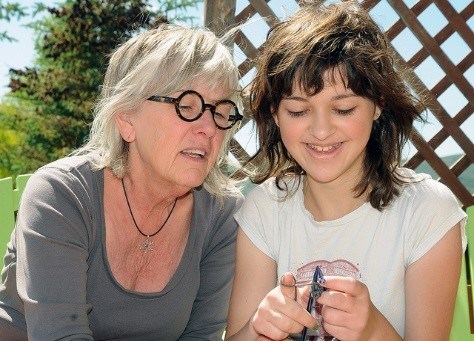 If you are a grandparent or providing kinship care to a school age child, you will need to know about the new law to support children's mental health. Illinois Gov. JB Pritzker signed a bill into law Thursday that will require public school students in grades 3 through 12 in the state to undergo a mental health screening each year. The change will go into effect in the 2027-2028 school year with at least one screening per student required annually, according to a press release from Pritzker's office. Pritzker also said the new legislation makes Illinois the first state to mandate universal mental health assessments for public school students.
If you are a grandparent or providing kinship care to a school age child, you will need to know about the new law to support children's mental health. Illinois Gov. JB Pritzker signed a bill into law Thursday that will require public school students in grades 3 through 12 in the state to undergo a mental health screening each year. The change will go into effect in the 2027-2028 school year with at least one screening per student required annually, according to a press release from Pritzker's office. Pritzker also said the new legislation makes Illinois the first state to mandate universal mental health assessments for public school students.
To read the press release go to: The State of Illinois Newsroom
SAMHSA'S Input
 Young people are going to use social media and other online platforms. #SocialMediaDay
Young people are going to use social media and other online platforms. #SocialMediaDay
Check out these resources to encourage parents and caregivers to have open and collaborative communication about their child’s online use: http://samhsa.gov/kids.../kohs-report-safe-internet-use
April
Child Abuse Prevention Month
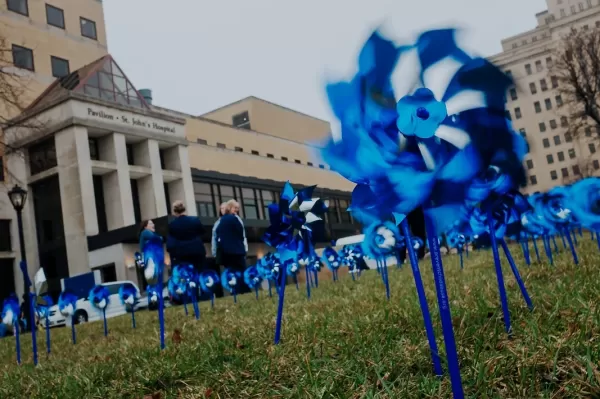 Child Abuse Prevention Month is all about kids: keeping them safe and making sure they all grow up in safe nurturing homes. As an adult caregiver of our littles ones, there are many tools offered for you during Child Abuse Prevention Month as they are geared towards adults, Prevent Child Abuse Illinois shares the role all of us can play and kids can still take part as well. They provide some easy activities that kids can do in support of Child Abuse Prevention Month!
Child Abuse Prevention Month is all about kids: keeping them safe and making sure they all grow up in safe nurturing homes. As an adult caregiver of our littles ones, there are many tools offered for you during Child Abuse Prevention Month as they are geared towards adults, Prevent Child Abuse Illinois shares the role all of us can play and kids can still take part as well. They provide some easy activities that kids can do in support of Child Abuse Prevention Month!
Check out Kid Activities
The Illinois Department on Aging
 Grandparents and other Relatives Raising Grandchildren Program offers:
Grandparents and other Relatives Raising Grandchildren Program offers:
- Information to caregivers about available services.
- Assistance to caregivers in gaining access to services.
- Individual counseling, support groups and caregiver training.
- Respite care to enable caregivers to be temporarily relieved from their caregiving responsibilities.
Supplemental services, on a limited basis, to complement the care provided by caregivers or address a short-term caregiver emergency.
Kinship and School Success
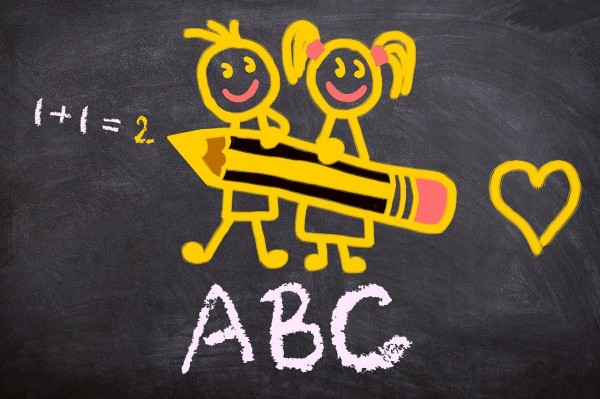 Generations United shares that data shows that about 2.5 million children across the United States are being raised in grandfamilies or other kinship care. Their report Pathways to Success: K-12 Education Support for Kinship and Grandfamilies uncovered three key themes about the education experiences of the nearly 2.5 million children being raised in grandfamilies and kinship care:
Generations United shares that data shows that about 2.5 million children across the United States are being raised in grandfamilies or other kinship care. Their report Pathways to Success: K-12 Education Support for Kinship and Grandfamilies uncovered three key themes about the education experiences of the nearly 2.5 million children being raised in grandfamilies and kinship care:
- Grandfamily and other kin caregivers face overwhelming barriers to supporting the education of children in their care.
- Despite this, their strength, resilience, determination and the power of family connection makes their home the best place for children who can’t remain with their parents. Children in grandfamilies and kinship care have better academic outcomes than children raised in foster care with non-kin.
- And when grandfamilies get access to critical supports, the children’s academic outcomes can soar.
Schools can serve as hubs of support for kinship/grandfamilies by providing wraparound services to connect them to needed benefits and supports.
Visit: State of the Grandfamilies and Kinship Care Report
Supporting Intergenerational Efforts
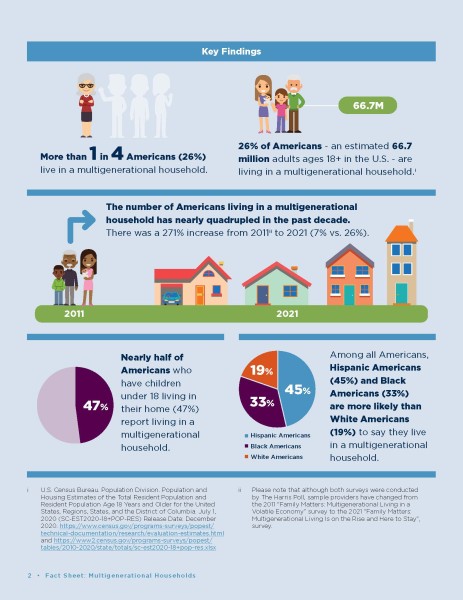 If you are working with families involved in kinship care, Generations United is offering a comprehensive bibliography to help you in the family efforts. This comprehensive bibliography complements the report Promoting Intergenerational Teaching and Learning in Higher Education: A Michigan Initiative.
If you are working with families involved in kinship care, Generations United is offering a comprehensive bibliography to help you in the family efforts. This comprehensive bibliography complements the report Promoting Intergenerational Teaching and Learning in Higher Education: A Michigan Initiative.
Check this resource out on: Bibliography.TeachingLearning.4.24.pdf (gu.org).
Spending Time Together
 Make memories. Build safe places for your little ones.
Make memories. Build safe places for your little ones.
The ABCs of Reunification
Written by Jennifer Lee, Children’s Bureau National Foster Care Specialist
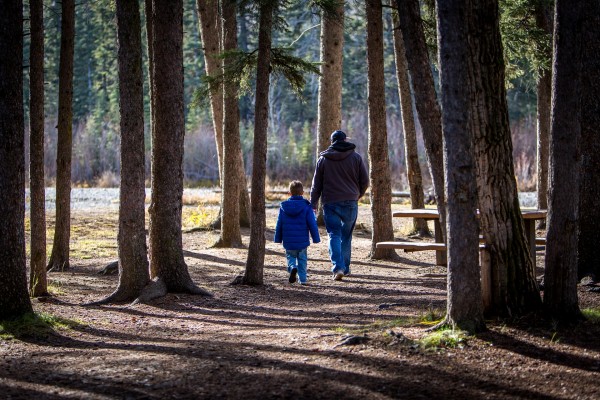 During National Reunification Month this past June, we looked at the importance of reunification through the lens of the ABCs by Acknowledging that all families deserve an opportunity for reunification, Believing that families can achieve this goal, and Committing to a culturally responsive approach to reunification. Grounded in the simplicity of the ABCs is the absolute ability to transform lives and create an environment where every child, youth, and young adult is nurtured and encouraged to thrive within their family and community.
During National Reunification Month this past June, we looked at the importance of reunification through the lens of the ABCs by Acknowledging that all families deserve an opportunity for reunification, Believing that families can achieve this goal, and Committing to a culturally responsive approach to reunification. Grounded in the simplicity of the ABCs is the absolute ability to transform lives and create an environment where every child, youth, and young adult is nurtured and encouraged to thrive within their family and community.
Learn more at: The ABCs of Reunification—June 2024 | Vol. 25, No. 5 (hhs.gov)
May 2024
Join us for Sesame Street

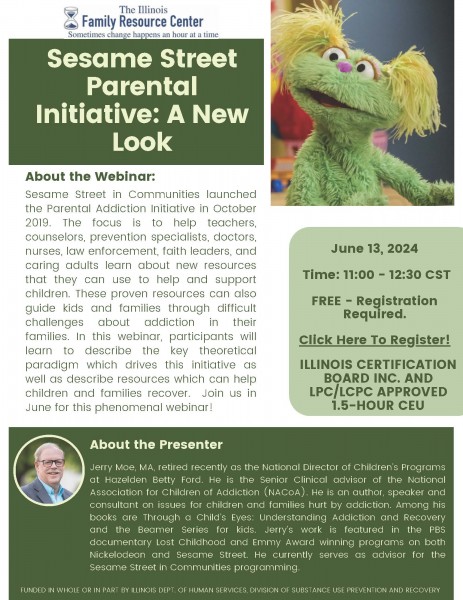 As grandparents or kinship caregivers, your life is often impacted by the chaos of substance misuse of your "Littles." They often experience the impact of substance misuse in the home or with other close relationships in a manner of misunderstanding and often grief. Sesame Street Workshop has been helping children since 2019 with understanding they are not alone and they can be okay. Jerry Moe has been involved with designing the content and developing materials to support the project. Jerry will deliver a webinar regarding this journey and share the tools with you to help your children and he offers the tools, videos and information for to make this journey with your children. Join us in the process.
As grandparents or kinship caregivers, your life is often impacted by the chaos of substance misuse of your "Littles." They often experience the impact of substance misuse in the home or with other close relationships in a manner of misunderstanding and often grief. Sesame Street Workshop has been helping children since 2019 with understanding they are not alone and they can be okay. Jerry Moe has been involved with designing the content and developing materials to support the project. Jerry will deliver a webinar regarding this journey and share the tools with you to help your children and he offers the tools, videos and information for to make this journey with your children. Join us in the process.
Activities for Kids and Families from Sesame Street
 If you are providing care for young ones through kinship care or grandparenting, you are very likely to be managing mental health issues for your little one and maybe, for yourself. Sesame Street’s Elmo is not the only friend wanting to help. All the Sesame furry fuzzy friends are ready to help you talk to your kids about their feelings, help them label them, and find ways to manage them. Noticing children’s real emotional distress can be big and somewhat scary for caregivers. We may be concerned about saying or doing the wrong thing. Consider how to best care for little ones. One good resource is Elmo and friends. Take time to read and try the list of six mental health activities that may help.
If you are providing care for young ones through kinship care or grandparenting, you are very likely to be managing mental health issues for your little one and maybe, for yourself. Sesame Street’s Elmo is not the only friend wanting to help. All the Sesame furry fuzzy friends are ready to help you talk to your kids about their feelings, help them label them, and find ways to manage them. Noticing children’s real emotional distress can be big and somewhat scary for caregivers. We may be concerned about saying or doing the wrong thing. Consider how to best care for little ones. One good resource is Elmo and friends. Take time to read and try the list of six mental health activities that may help.
Check out: 6 Engaging Mental Health Activities for Kids and Families from Sesame Street - Sesame Workshop
May 2024
National Foster Care Month
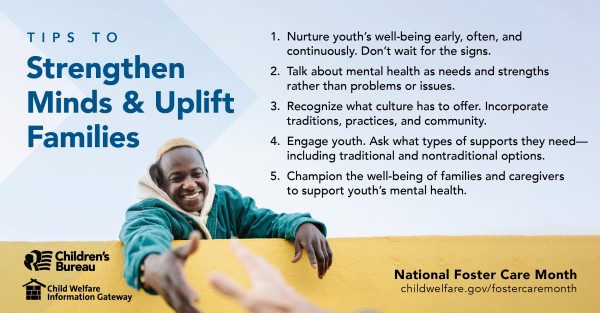 May is here! That means it's National Foster Care Month. Use the official 2024 outreach toolkit from the Children's Bureau and Child Welfare Information Gateway to help raise awareness.
May is here! That means it's National Foster Care Month. Use the official 2024 outreach toolkit from the Children's Bureau and Child Welfare Information Gateway to help raise awareness.
Access the toolkit here: https://www.childwelfare.gov/.../national-foster-care.../...
April 2024
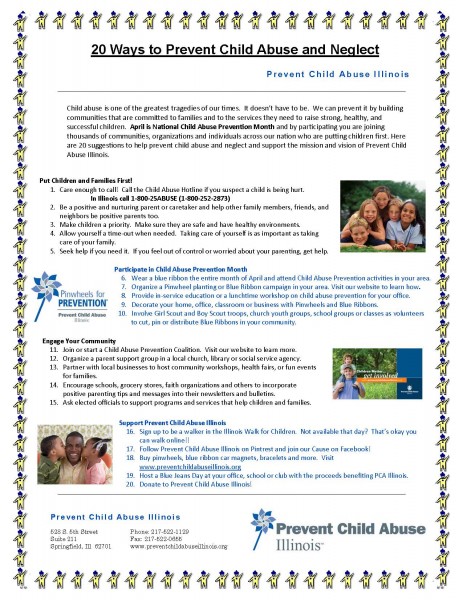 April is Prevent Child Abuse Awareness Month. PCA of Illinois offers tools to address the health and safety of our children. As a grandparent or kinship caregiver, take time to review the information and resources available to help you in your journey.
April is Prevent Child Abuse Awareness Month. PCA of Illinois offers tools to address the health and safety of our children. As a grandparent or kinship caregiver, take time to review the information and resources available to help you in your journey.
For important information and resources, visit: 2014 4 April 20 Ways.pub (preventchildabuseillinois.org)
Did You Know?
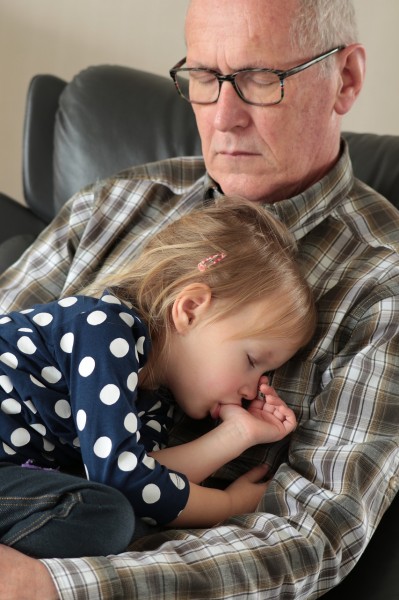 The 2022 National Strategy to Support Family Caregivers was created jointly by the advisory councils of RAISE Family Caregiving Act and the Supporting Grandparents Raising Grandchildren Act. It will be updated in response to public comments. Be a part of the change. Take a look and comment when appropriate.
The 2022 National Strategy to Support Family Caregivers was created jointly by the advisory councils of RAISE Family Caregiving Act and the Supporting Grandparents Raising Grandchildren Act. It will be updated in response to public comments. Be a part of the change. Take a look and comment when appropriate.
You will find the document at: 2022 National Strategy to Support Family Caregivers | ACL Administration for Community Living.
Kinship Care
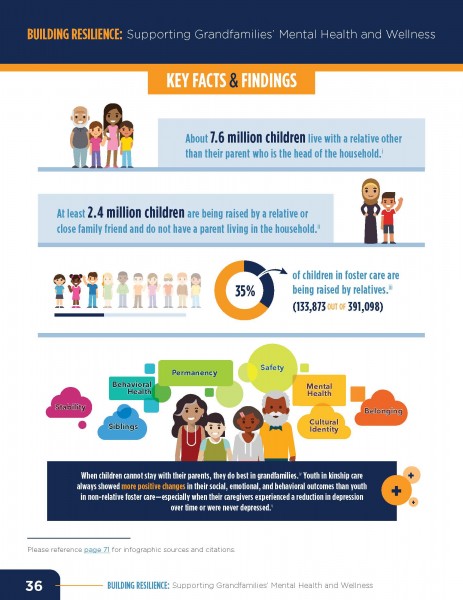 As the world is becoming more challenging, kinship care providers are needing more support of education and tools for managing resources. One of the best resources for education and data is the organization, Generations United. One of the key findings in the 2023 annual report is the facts regarding the increase of kin care due to substance use. Between 2002 and 2019, grandparents reporting parents’ substance use as a reason for caregiving jumped from 21% to 40%. The states with the highest percentages of grandparents raising grandchildren are also the states with the highest opioid prescribing rates. Research has indicated that opiate dependence may have relapse rates as high as 91%,98 and for those with alcohol dependence, relapse happens within one year for up to 70%.
As the world is becoming more challenging, kinship care providers are needing more support of education and tools for managing resources. One of the best resources for education and data is the organization, Generations United. One of the key findings in the 2023 annual report is the facts regarding the increase of kin care due to substance use. Between 2002 and 2019, grandparents reporting parents’ substance use as a reason for caregiving jumped from 21% to 40%. The states with the highest percentages of grandparents raising grandchildren are also the states with the highest opioid prescribing rates. Research has indicated that opiate dependence may have relapse rates as high as 91%,98 and for those with alcohol dependence, relapse happens within one year for up to 70%.
For resources check out: GU_2023-Grandfamilies-FullReport-FINAL.pdf
Tips for Kinship Caregivers
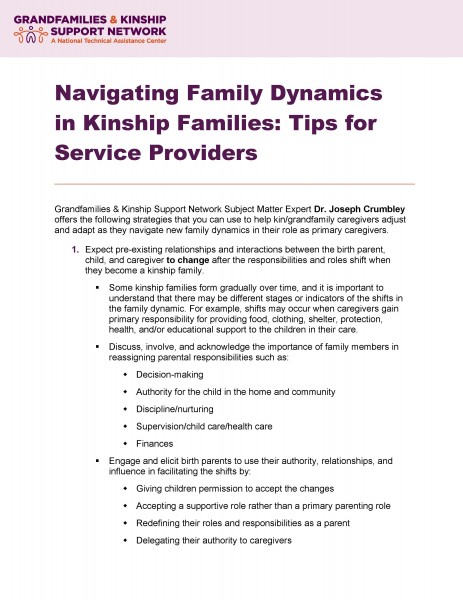 Grandfamilies & Kinship Support Network Subject Matter Expert Dr. Joseph Crumbley offers strategies that you can use to help kin/grandfamily caregivers adjust and adapt as they navigate new family dynamics in their role as primary caregivers. In this tip sheet, you will find tools to support our caregivers and the children they care for. Check out the full document for great hints and usable tools.
Grandfamilies & Kinship Support Network Subject Matter Expert Dr. Joseph Crumbley offers strategies that you can use to help kin/grandfamily caregivers adjust and adapt as they navigate new family dynamics in their role as primary caregivers. In this tip sheet, you will find tools to support our caregivers and the children they care for. Check out the full document for great hints and usable tools.
Adoption and Guardianship
 Generations United with support from the Dave Thomas Foundation for Adoption, created the included brief of Illinois state-specific information that has a focus on adoption and guardianship for children in kinship foster care so that these children can exit foster care into permanent families. The brief provides general information about the two options, how they differ, and trends in state law as they impact these options. It is important that caseworkers, relative caregivers, older children, and their birth parents understand the two options and determine, based on all the information, what is best for their particular child and family.
Generations United with support from the Dave Thomas Foundation for Adoption, created the included brief of Illinois state-specific information that has a focus on adoption and guardianship for children in kinship foster care so that these children can exit foster care into permanent families. The brief provides general information about the two options, how they differ, and trends in state law as they impact these options. It is important that caseworkers, relative caregivers, older children, and their birth parents understand the two options and determine, based on all the information, what is best for their particular child and family.
2023-Grandfamilies-Adoption-Guardianship-State-Chart-Illinois.pdf
November is National Adoption Month
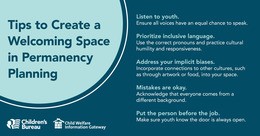 Be prepared. National Adoption Month is coming this November. The Child Welfare Information Gateway is offering tools to support the issues related to the process of adoption, especially teenagers. Pursuing adoption for teens in foster care requires engaging young people every step of the way. Find updated resources that can help you take action in supporting youth in setting and achieving their permanency goals.
Be prepared. National Adoption Month is coming this November. The Child Welfare Information Gateway is offering tools to support the issues related to the process of adoption, especially teenagers. Pursuing adoption for teens in foster care requires engaging young people every step of the way. Find updated resources that can help you take action in supporting youth in setting and achieving their permanency goals.
- Discover new relationship-building tools and strategies from Children's Bureau grantee research. Learn about projects focused on building relationships with teens; understanding the impact of trauma, separation, and loss; and preparing teens and adoptive families for permanency.
- Use the youth engagement resources to create a welcoming space for youth to explore their identity. Find resources for youth by youth, that highlight the experiences of foster care, as well as strategies to empower youth and promote well-being.
September is Kinship Month
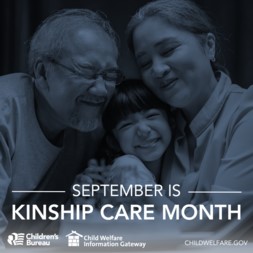 In history, kinship care has been common in many communities of color to sustain family relationships and preserve the culture and history. Our research shows that placing children in kinship reduces family separation trauma and helps children maintain a sense of family, belonging, and identity. It also supports reunification efforts. During Kinship Care Month a demonstration of the community commitment to a family-centered child welfare system helps recognize the importance of kinship placement and the support of kin caregivers. Working together, we can all provide caregivers and agencies with the resources and tools they need to improve reunification positive long-term outcomes.
In history, kinship care has been common in many communities of color to sustain family relationships and preserve the culture and history. Our research shows that placing children in kinship reduces family separation trauma and helps children maintain a sense of family, belonging, and identity. It also supports reunification efforts. During Kinship Care Month a demonstration of the community commitment to a family-centered child welfare system helps recognize the importance of kinship placement and the support of kin caregivers. Working together, we can all provide caregivers and agencies with the resources and tools they need to improve reunification positive long-term outcomes.
Visit: September is Kinship Care Month! (govdelivery.com)
Tips for Kinship Success
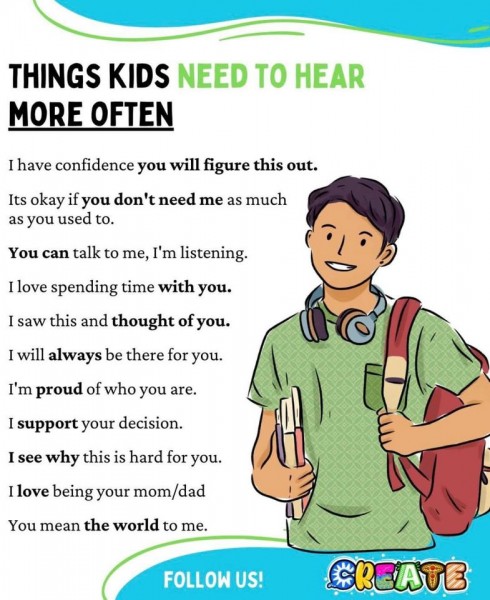
Decision Assistance
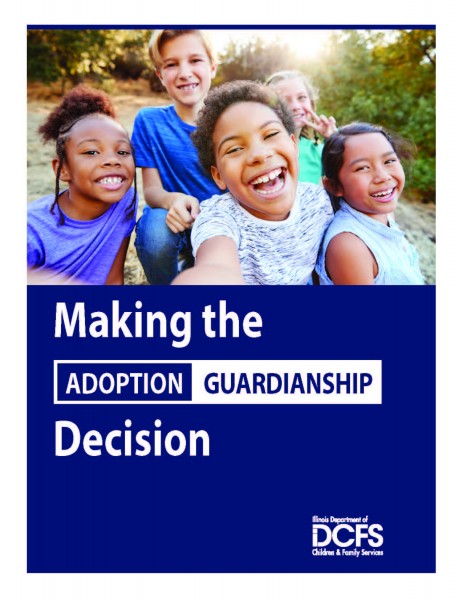 As the number of grandparents and other kin providing homes and family to the children of parents experiencing substance use disorder and/or mental health, the decision regarding fostering and potential adoption is increasing. It is reported by Grandfamilies.org that in 2021 Illinois had over 85,000 children being raised in kinship homes with no parent present. It is also reported that for every child reported in kinship there are 10 not officially reported. The month of May was National Foster Care Month. As we move into June it may be the time to learn more of how to support our families and the children in care. Decisions to take guardianship or adopt is life changing and for many, one created by substance misuse of parents or caregivers. The Illinois Dept. of Children and Family Services (DCFS), has published a document to assist in understanding the decision process of kinship care through fostering and/or adoption. Support the future of your families impacted by substance use disorder.
As the number of grandparents and other kin providing homes and family to the children of parents experiencing substance use disorder and/or mental health, the decision regarding fostering and potential adoption is increasing. It is reported by Grandfamilies.org that in 2021 Illinois had over 85,000 children being raised in kinship homes with no parent present. It is also reported that for every child reported in kinship there are 10 not officially reported. The month of May was National Foster Care Month. As we move into June it may be the time to learn more of how to support our families and the children in care. Decisions to take guardianship or adopt is life changing and for many, one created by substance misuse of parents or caregivers. The Illinois Dept. of Children and Family Services (DCFS), has published a document to assist in understanding the decision process of kinship care through fostering and/or adoption. Support the future of your families impacted by substance use disorder.
For more information check out: cfs-1050-43-making-the-a-g-decision.pdf (illinois.gov). and Illinois GrandFacts State Fact Sheet 2021 Update.pdf (grandfamilies.org)
Mental Health Support in Foster Care
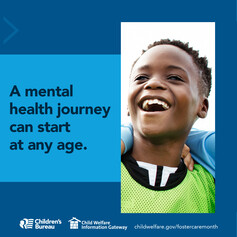 The Child Welfare Gateway and the Children’s Bureau remind us that during this Mental Health Awareness Month we need to remember the mental health our younger family members, especially those in kinship or foster care.
The Child Welfare Gateway and the Children’s Bureau remind us that during this Mental Health Awareness Month we need to remember the mental health our younger family members, especially those in kinship or foster care.
Check out their resources on: May is Here! It's National Foster Care Month (govdelivery.com)
Learning About Emotions
 If you are one of many who are helping young family members through a "tough" time in kinship care, emotions are a daily concern for you and your young ones. Encourage your child to talk about their emotions, whether happy or sad or angry. Help your child learn words to describe them. Managing emotions is key to mental health and happiness. Learning how to manage feelings is so important. When kids have big emotions, it may be difficult for them to listen and learn in that moment. Step back and give them some space to calm down. Then talk about what happened and how they might handle it differently next time. This is a "ah ha" moment for them to learn from their experience. It's helpful to talk about feelings when things are calm and children can practice how to manage emotions when things get tough. Visit the Public Broadcasting Service (PBS) to learn more about helping our young ones thrive.
If you are one of many who are helping young family members through a "tough" time in kinship care, emotions are a daily concern for you and your young ones. Encourage your child to talk about their emotions, whether happy or sad or angry. Help your child learn words to describe them. Managing emotions is key to mental health and happiness. Learning how to manage feelings is so important. When kids have big emotions, it may be difficult for them to listen and learn in that moment. Step back and give them some space to calm down. Then talk about what happened and how they might handle it differently next time. This is a "ah ha" moment for them to learn from their experience. It's helpful to talk about feelings when things are calm and children can practice how to manage emotions when things get tough. Visit the Public Broadcasting Service (PBS) to learn more about helping our young ones thrive.
Check out: Managing Emotions | PBS KIDS for Parents
Tools to Help Change
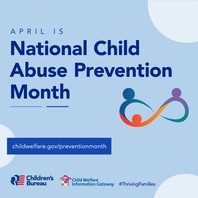 April is coming it brings the National Child Abuse Prevention Month. Just Launched! Take a look at how focus is moving from the challenge to the change this year on the National Child Abuse Prevention Month website. As a caring grandparent, kin relation, caring neighbor or community, learn more about keeping our little ones safe. Check out new prevention resources in English and Spanish that will help you support families. Visit today and learn more about this year's theme: Doing Things Differently: Moving from the Challenge to the Change.
April is coming it brings the National Child Abuse Prevention Month. Just Launched! Take a look at how focus is moving from the challenge to the change this year on the National Child Abuse Prevention Month website. As a caring grandparent, kin relation, caring neighbor or community, learn more about keeping our little ones safe. Check out new prevention resources in English and Spanish that will help you support families. Visit today and learn more about this year's theme: Doing Things Differently: Moving from the Challenge to the Change.
Check out: Just Launched! Visit the National Child Abuse Prevention Month Website (govdelivery.com)
Stress Busters
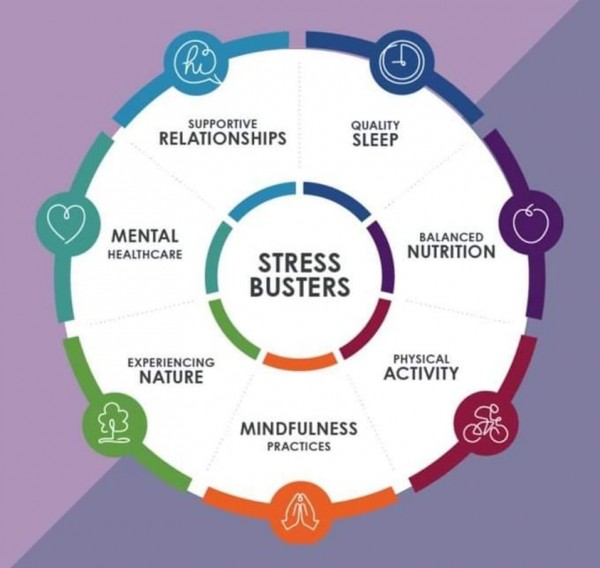 The California Surgeon General offers this tool to address the stress in our lives. Use this tool on your daily recovery journey. Bust those stressors and support your health. As the primary caregiver taking self-care is so important. Your life changes when you become a kincare family. To best navigate the journey, lessen your stress and take time to relax, laugh and be grateful.
The California Surgeon General offers this tool to address the stress in our lives. Use this tool on your daily recovery journey. Bust those stressors and support your health. As the primary caregiver taking self-care is so important. Your life changes when you become a kincare family. To best navigate the journey, lessen your stress and take time to relax, laugh and be grateful.
Building Gratitude
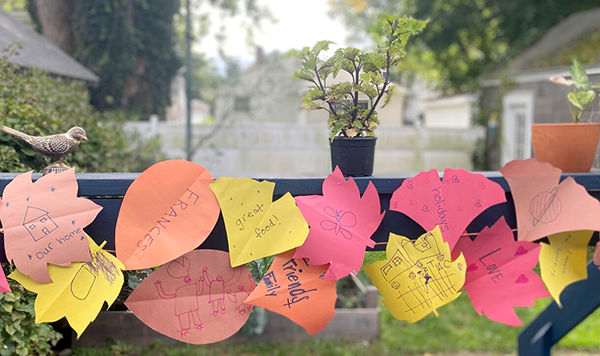 Grandparents and other kinship caregivers are heroes to help our children live a safe and healthy life. As the holidays approach, it is important to help them experience the traditions and rituals offered by a safe and strong environment. Helping kids understand and show gratitude is not always an easy task. PBS Kids for Parents website offers Thanksgiving tools to explore all there is to be thankful for by building a festive and fun gratitude garland with your family. Be sure to make enough leaves for everyone in the family to participate.
Grandparents and other kinship caregivers are heroes to help our children live a safe and healthy life. As the holidays approach, it is important to help them experience the traditions and rituals offered by a safe and strong environment. Helping kids understand and show gratitude is not always an easy task. PBS Kids for Parents website offers Thanksgiving tools to explore all there is to be thankful for by building a festive and fun gratitude garland with your family. Be sure to make enough leaves for everyone in the family to participate.
Visit: Make a Grateful Garland With Your Family |… | PBS KIDS for Parents.
Grandfamilies & Kinship Support Network Launches Website!
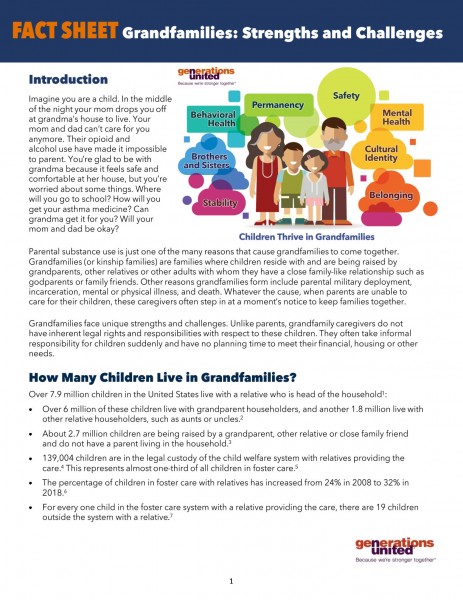 The Grandfamilies & Kinship Support Network: A National Technical Assistance Center has launched its new website. Check it out to find a variety of resources. The resource library will keep growing, so please visit often to discover more. Visit NOW! at www.GKSNetwork.org!
The Grandfamilies & Kinship Support Network: A National Technical Assistance Center has launched its new website. Check it out to find a variety of resources. The resource library will keep growing, so please visit often to discover more. Visit NOW! at www.GKSNetwork.org!
Family Roles
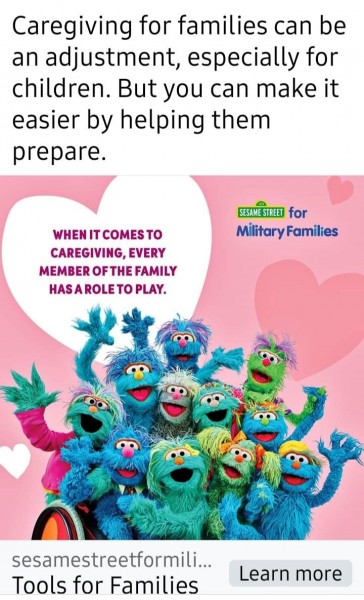 If your family structure changed due to parents' inability to fill the role because of substance use, take a look at the tools Sesame Street offers to families. It may help to explore the information and reduce stress and build strong goals for a healthy change. It is a change in a lifestyle and family roles as grandparents begin their caregiving journey.
If your family structure changed due to parents' inability to fill the role because of substance use, take a look at the tools Sesame Street offers to families. It may help to explore the information and reduce stress and build strong goals for a healthy change. It is a change in a lifestyle and family roles as grandparents begin their caregiving journey.
Teaching Responsibility
 As a parent/caregiver one of your most important goals is to build responsible children who become successful adults. The Child Development Institute offers some information to help you in that teaching role. They recommend the following as a guide.
As a parent/caregiver one of your most important goals is to build responsible children who become successful adults. The Child Development Institute offers some information to help you in that teaching role. They recommend the following as a guide.
- Treat your child with respect and care.
- Reinforce the positive.
- Share household tasks and chores.
- Teach money management skills.
- Allow your child to face natural consequences and learn from mistakes.
- When teaching your child a new behavior, give clear simple instructions. Be specific about your instructions.
- Don’t let your child off the hook if they misbehave in school.
- Give your child some space and freedom.
Visit: How to Teach Your Child to Be More Responsible | Parenting (childdevelopmentinfo.com)
Daycare
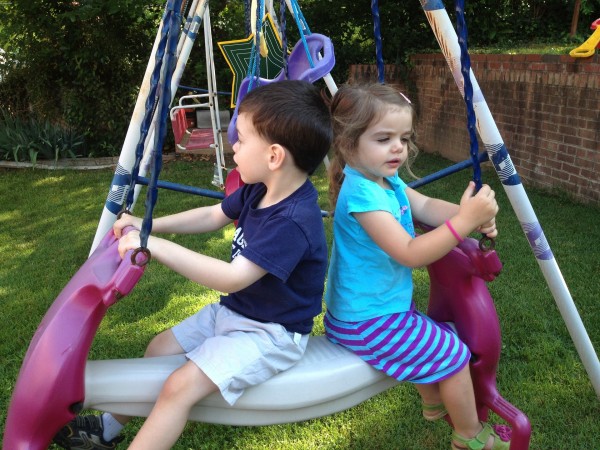 Are you a parent or grandparent looking for childcare? Check out who qualifies to receive free referrals and information about childcare programs from their local Child Care Resource and Referral (CCR&R) agency or online at www.excelerateillinois.com. Referrals to all types of childcare providers - licensed centers, family childcare homes, and group childcare homes as well as license exempt centers and homes are available. Information on quality of care, State licensing and the Illinois ExceleRate system are also available.
Are you a parent or grandparent looking for childcare? Check out who qualifies to receive free referrals and information about childcare programs from their local Child Care Resource and Referral (CCR&R) agency or online at www.excelerateillinois.com. Referrals to all types of childcare providers - licensed centers, family childcare homes, and group childcare homes as well as license exempt centers and homes are available. Information on quality of care, State licensing and the Illinois ExceleRate system are also available.
Help Your Little One Succeed
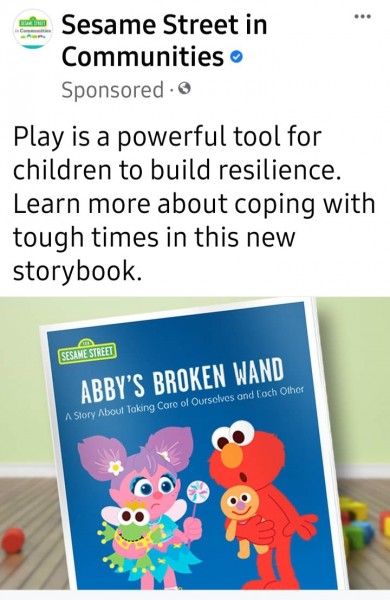 As grandparents we may assume many roles. One may be as the primary caregiver. If that is your role, most likely your “grandkid” needs some help with building resilience in their life. Sesame Street in Communities offers tools to support this achieve this goal.
As grandparents we may assume many roles. One may be as the primary caregiver. If that is your role, most likely your “grandkid” needs some help with building resilience in their life. Sesame Street in Communities offers tools to support this achieve this goal.
Visit: Home - Sesame Street in Communities - Sesame Street in Communities
Building Healthy Emotions
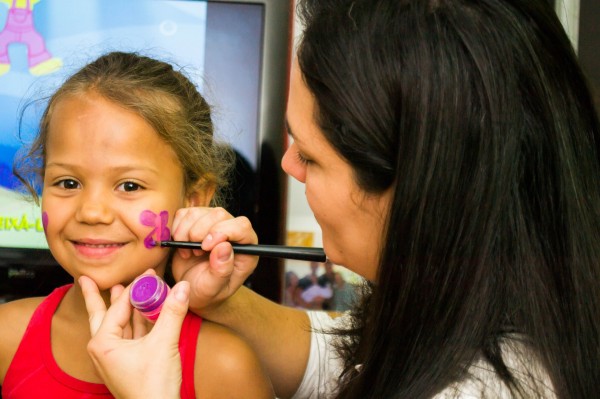 PBS KIDS advises parents to support our children in these changing times. Helping them name their feelings is one way to support them in understanding how they react to different conditions. When able to talk about how they are feeling, they can work on expressing themselves in positive ways, even when they are upset, frustrated, or angry. Build your relationship with making a “feeling words” book with your child to help recognize different emotions through pictures and words. Keep growing healthy emotions by reviewing the book together and practice talking about different feelings.
PBS KIDS advises parents to support our children in these changing times. Helping them name their feelings is one way to support them in understanding how they react to different conditions. When able to talk about how they are feeling, they can work on expressing themselves in positive ways, even when they are upset, frustrated, or angry. Build your relationship with making a “feeling words” book with your child to help recognize different emotions through pictures and words. Keep growing healthy emotions by reviewing the book together and practice talking about different feelings.
Check out PBS at: Create Your Own Feeling Words Book | Crafts… | PBS KIDS for Parents.
Helping Children
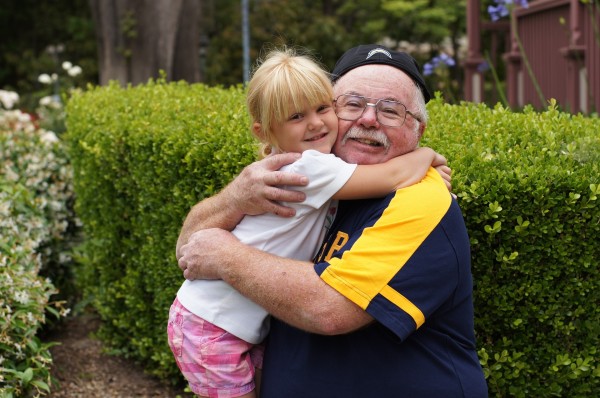 Who is there when parents are working on their recovery journey? When the parent focus is on sobriety, children can feel left out. Often the child turns to someone who has shared in some way that they are available making it feel safe for the child to talk. It could be a grandparent, the neighbor who cares, or a coach the child can trust with their “biggest worry.” The goal is to put tools in the hands of caring family/friends they can be a consistent support and be an advocate for the child by helping the addicted parent on their journey. The National Association for Children of Addiction offers important information to support our families and their children. Visit The Power of Forgiveness in Family Recovery - Nacoa for more materials.
Who is there when parents are working on their recovery journey? When the parent focus is on sobriety, children can feel left out. Often the child turns to someone who has shared in some way that they are available making it feel safe for the child to talk. It could be a grandparent, the neighbor who cares, or a coach the child can trust with their “biggest worry.” The goal is to put tools in the hands of caring family/friends they can be a consistent support and be an advocate for the child by helping the addicted parent on their journey. The National Association for Children of Addiction offers important information to support our families and their children. Visit The Power of Forgiveness in Family Recovery - Nacoa for more materials.
